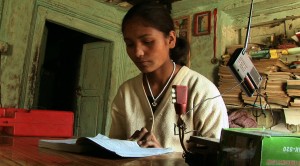Growing up in Nigeria, the idea that improving the lives of women was a cause worth fighting for didn't just come from organizations, or brochures, or formal programming; I had strong women around me who constantly put this into practice in the every day, including my own mother.
-
-
For Women’s History Month: Writing Our Way Back into History
In order to address the dearth of women's histories -- our stories, and voices being undocumented, under-valued, and falsely represented without reprimand -- women must begin telling their own stories. We must essentially write our way back into history.
-
International Women’s Day Screening of Africa’s “Waiting for Superman” — “To Educate a Girl”
Framed by the United Nations global initiative to provide equal access to education for girls by 2015, the documentary film, To Educate a Girl, takes a ground-up and visually stunning view of that effort through the eyes of girls in Nepal and Uganda, two countries emerging from conflict and struggling…


